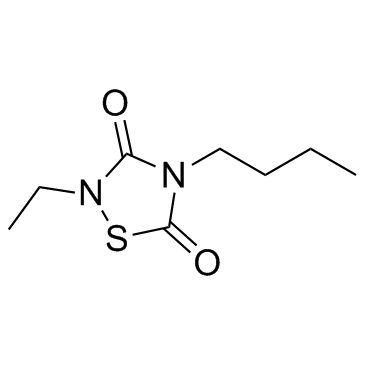CCG 203769 |
| Katalog-Nr.GC30875 |
CCG 203769 ist ein selektiver G-Protein-Signalweg (RGS4)-Inhibitor, der die RGS4-Gαo-Protein-Protein-Wechselwirkung in vitro mit einer IC50 von 17 nM blockiert.
Products are for research use only. Not for human use. We do not sell to patients.

Cas No.: 410074-60-1
Sample solution is provided at 25 µL, 10mM.
CCG-203769 is a selective G protein signaling (RGS4) inhibitor, which blocks the RGS4-Gαo protein-protein interaction in vitro with an IC50 of 17 nM.
CCG-203769 also displays dramatic selectivity (8- to >5000-fold) for RGS4 over other RGS proteins. CCG-203769 inhibits RGS19 with an IC50 of 140 nM (8-fold selective for RGS4) and 6 μM for RGS16 (350-fold selective for RGS4). The closely related RGS8 is very weakly inhibited (IC50>60 μM) providing >4500-fold selectivity for RGS4. CCG-203769 inhibits GSK-3β with an IC50 value of 5 μM. CCG-203769 does not inhibit the cysteine protease papain at 100 μM. CCG-203769 does not inhibit RGS7, which lacks cysteines in the RGS domain. CCG-203769 inhibits RGS/Gαo binding in an RGS-selective manner. CCG-203769 enhances Gαq-dependent cellular Ca2+ signaling in an RGS4-dependent manner. CCG-203769 also blocks the GTPase accelerating protein (GAP) activity of RGS4. In single-turnover and steady-state GTPase experiments with Gαo and Gαi1, the rate of GTP hydrolysis is strongly stimulated by RGS4, and this effect is inhibited by CCG-203769 with an IC50<1 μM[1].
To determine whether this genetic disruption of RGS4 function can be replicated pharmacologically, CCG-203769 is tested for effects on Carbamoylcholine chloride-mediated bradycardia in conscious, unrestrained rats. Carbamoylcholine chloride (0.1 mg/kg, IP) produces a modest decrease in heart rate compared to that of a saline vehicle control. CCG-203769 (10 mg/kg, IV) has no significant effect upon heart rate when given alone. However, CCG-203769, administered immediately prior to Carbamoylcholine chloride, significantly potentiates the bradycardic effect (p < 0.05). Given the functional role of RGS4 in Parkinson's disease models, CCG-203769 is tested in a pharmacologic model of D2 antagonist-induced bradykinesia. Raclopride administration in rats causes increased hang time in the bar test, which is rapidly reversed by doses of CCG-203769 ranging from 0.1 to 10 mg/kg. The lowest dose, 0.01 mg/kg has no effect, while 0.1 mg/kg produces a submaximal effect. The higher doses, 1 and 10 mg/kg, produce equivalent effects. Similarly, the raclopride-induced paw drag in mice is reversed by 0.1-10 mg/kg CCG-203769[1].
[1]. Blazer LL, et al. Selectivity and anti-Parkinson's potential of thiadiazolidinone RGS4 inhibitors. ACS Chem Neurosci. 2015 Jun 17;6(6):911-9.
Average Rating: 5 (Based on Reviews and 2 reference(s) in Google Scholar.)
GLPBIO products are for RESEARCH USE ONLY. Please make sure your review or question is research based.
Required fields are marked with *




















